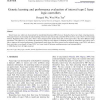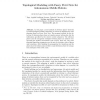64 search results - page 4 / 13 » Design of a fuzzy controller in mobile robotics using geneti... |
EAAI
2006
13 years 8 months ago
2006
Type-2 fuzzy sets, which are characterized by membership functions (MFs) that are themselves fuzzy, have been attracting interest. This paper focuses on advancing the understandin...
CEC
2007
IEEE
14 years 2 months ago
2007
IEEE
Abstract— Designing effective behavioral controllers for mobile robots can be difficult and tedious; this process can be circumvented by using unsupervised learning techniques w...
ICARCV
2002
IEEE
14 years 1 months ago
2002
IEEE
Cooperative robotic systems provide design and implementation challenges that are not easy to solve. This paper describes a parallel implementation for evolving cooperative roboti...
IEAAIE
1998
Springer
14 years 22 days ago
1998
Springer
In this paper a novel method of reference places' detection to build topological models is described, as well as an algorithm for route planning based on Fuzzy Petri Nets. The...
GECCO
2005
Springer
14 years 2 months ago
2005
Springer
A fuzzy controller is usually designed by formulating the knowledge of a human expert into a set of linguistic variables and fuzzy rules. Among the most successful methods to auto...



